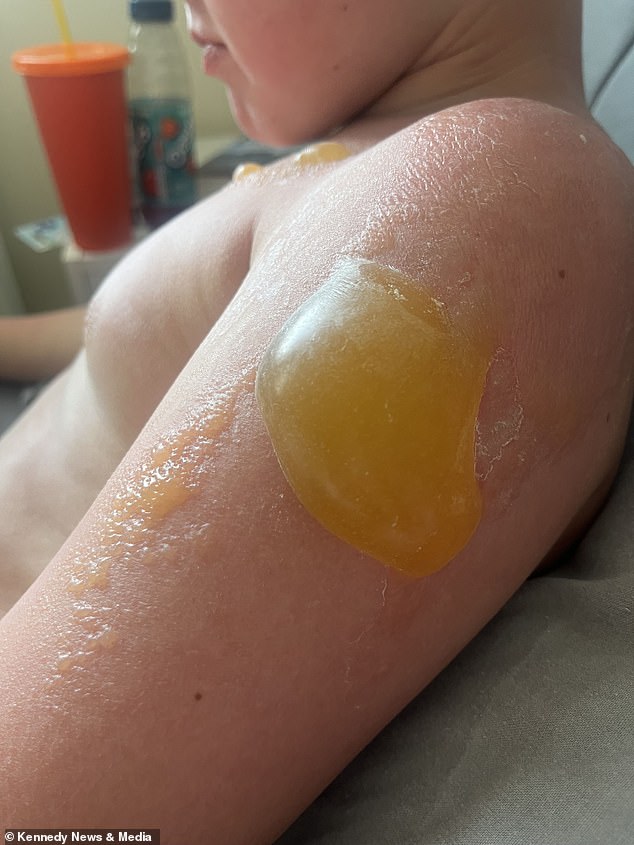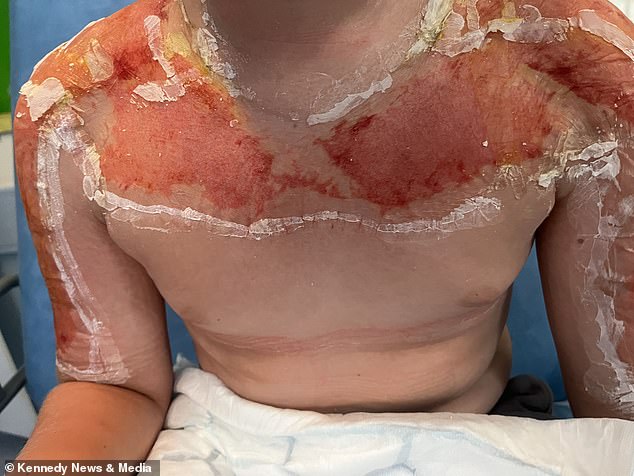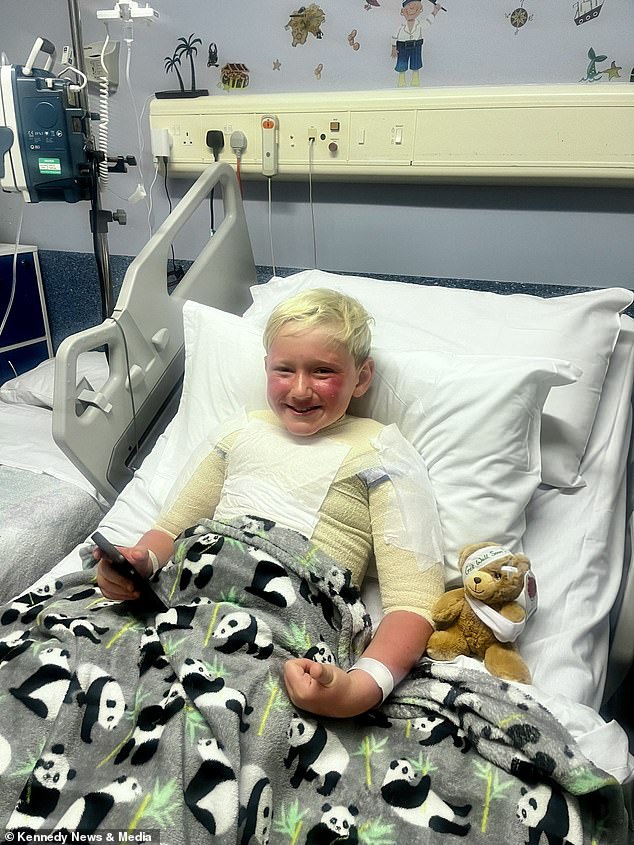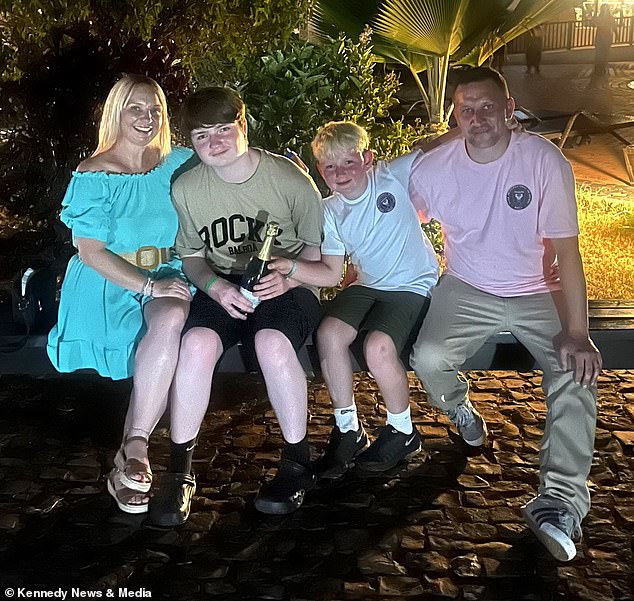Shocking footage shows the dangers of buying sunscreen abroad: 10-year-old hospitalised with painful burns after applying SPF90
A British schoolboy was so badly burned during the holidays that he required surgery after painful blisters developed all over his body.
This while the family was using sunscreen, which they now suspect was ‘expired’ or fake.
Disturbing footage shows 10-year-old Hector Harvey looking as though he has been ‘doused with hot water’, with huge yellow blisters and large areas of his skin peeling off.
Hector, originally from Nottingham, was on holiday with his family in Cape Verde, an archipelago off the African coast, in August this year. It was supposed to be the trip of a lifetime.
He left with his mother Natalie Harvey, 47, along with her partner Ben Limbrick, 40, and Hector’s brother Hugo, 15.
Hector Harvey was on holiday with his family in Cape Verde, an archipelago off the African coast, in August of this year. It was supposed to be the trip of a lifetime.

But a mishap with sunscreen left the 10-year-old looking like he had ‘hot water thrown on him’, with huge yellow blisters and large areas of his skin peeling off

After calling NHS 111 for help, he was eventually admitted to the Queen’s Medical Centre in Nottingham, where he was treated for sunburn and underwent surgery to have his blisters drained and cleaned.
The family from Nottingham had brought British sunscreen with them, which they used successfully for most of the trip.
However, on the last day of their holiday, their supplies ran out and they decided to buy a bottle of SPF90 from the shop in the hotel where they were staying.
They claimed they had used this liberally on Hector 30 minutes before he went to play in the pool at a temperature of 29 degrees Celsius.
Ms Harvey said she was reapplying it ‘constantly’ throughout the day.
But it wasn’t until Hector became sleepy and warm at the airport, just before their flight home, that the family first felt something was wrong.
When he landed, he was left with 3-inch, “watery” blisters on his chest, arms and shoulders.
After calling NHS 111 for help, he was eventually admitted to the Queen’s Medical Centre in Nottingham, where he was treated for sunburn and underwent surgery to have his blisters lanced and cleaned.
Mrs Harvey, a teacher, said the cause of Hector’s burns had not yet been proven. She claimed that doctors who treated her son had indicated that the cream bought abroad may have been out of date or counterfeit.

Mrs Harvey, a teacher, said that while the cause of Hector’s burns has yet to be proven, she claimed that doctors who treated her son suggested that the cream bought abroad may have been out of date or counterfeit and therefore did not protect him from the sun. Hector is recovering in hospital
She said she now wants to raise awareness for other families about the dangers of buying sunscreen outside the UK.
“On the last day we ran out of sunscreen and Hugo and I didn’t feel like going out, but Hector wanted to go out because he had made lots of friends on holiday,” she said.
‘Ben was going to take Hector out and we had seen in the hotel shop that they sold factor 90 sunscreen, so we thought that would be fine.
“We bought it and applied it in the apartment. Then we waited about 20 to 30 minutes before going out into the sun, so the sunscreen could soak in.”
Mrs Harvey recalls that her son and partner were doing well until they arrived at the airport.
“Hector seemed completely fine until we got to the airport. He seemed very sleepy and warm,” she said.
‘At the airport I bought some aloe vera to cool him down.
‘He was in the sun for about two hours. It was about 85 degrees and I was reapplying sunscreen the whole time.

Hector was on holiday in Cape Verde with his mother Natalie Harvey, 47, along with her partner Ben Limbrick, 40, and brother Hugo, 15
‘I was out in the sun for about 30 minutes without sunscreen and had no problems. However, my partner Ben, who also had sunscreen on, was also badly burned.
‘When Hector took his top off when we got home, he started getting blisters and they were about 3 inches full of water. They were on his shoulders, upper chest and back.
‘I couldn’t believe he was burned. He had used the highest factor sunscreen I had ever seen and he was burned.
‘I felt sick when I saw the blisters and I wished it was me.
‘I couldn’t understand what had gone wrong. I knew I had reapplied the sunscreen and done everything right and although I still berate myself it was incredibly unfair because I bought something in good faith and it didn’t work.
The doctor said that he had been to Cape Verde himself and that there could be several causes.
‘They suggested that the sunscreen might be expired, and later said it might be counterfeit.
“When they popped the blisters during the surgery, he had to be given oxygen and oxygen. They also had to clean him and bandage him to prevent him from getting an infection.”
Despite the severity of the burns, Hector has recovered well and is left with no scars.
Mrs Harvey said: ‘I don’t think he’ll have any scars from it but at the moment he’s blotchy and has red marks all over him.’
“He looks like hot water has been thrown on him.”
However, she added that doctors have warned her that Hector will be extra vulnerable to sunburn over the next two years.
She also said she would never buy sunscreen from another country again and would instead make sure she had enough stock in the UK, and urged other parents to take similar precautions.
“I would advise other parents to take an extra bottle of sunscreen with them and if you are buying sunscreen abroad, check to see if it has stars on the bottle and if it has a UVA rating,” she said.
Sunburn often lasts only a short time and mild, severe cases, such as Hector’s disease, may require medical attention.
Sunburn can also increase the risk of skin cancer in the future.
